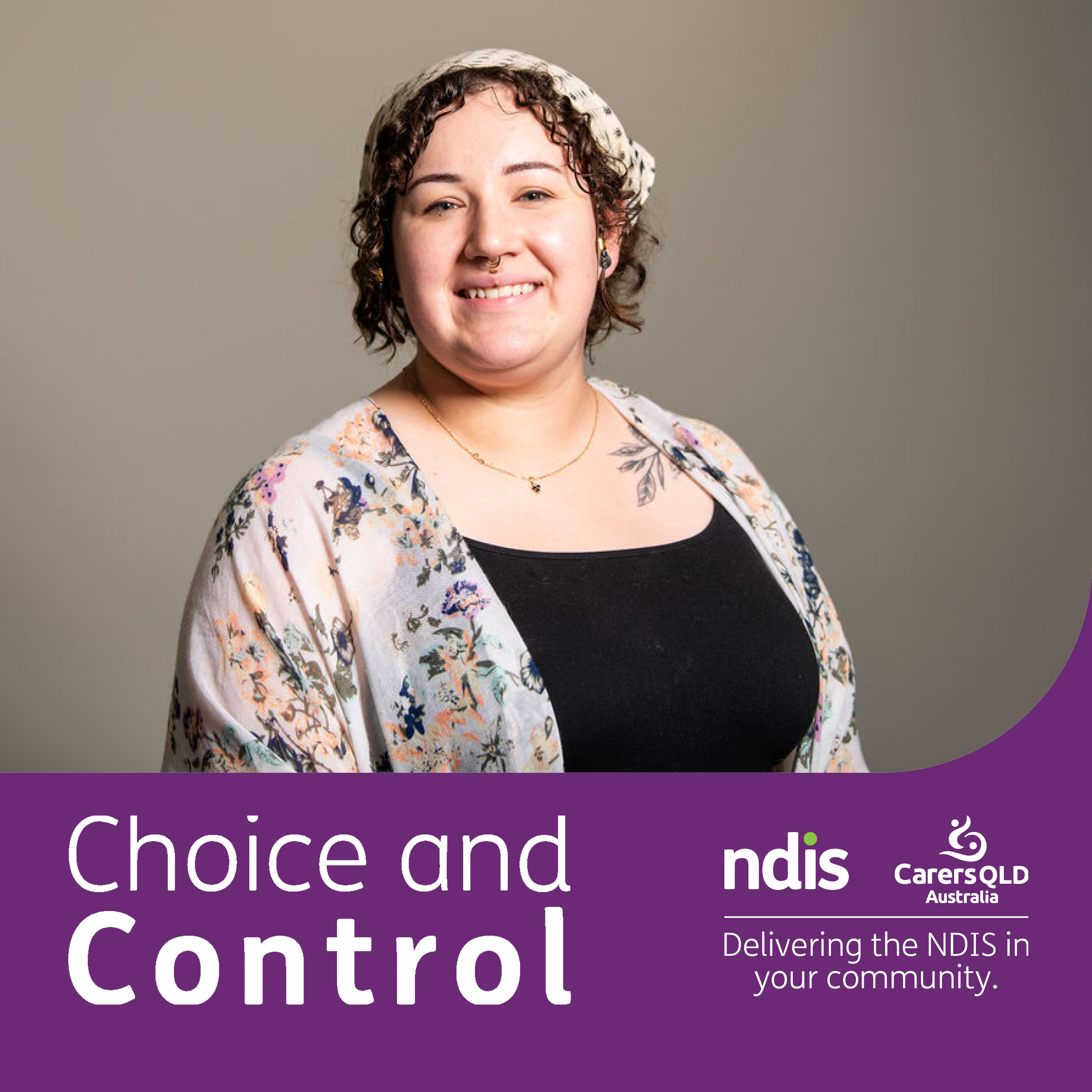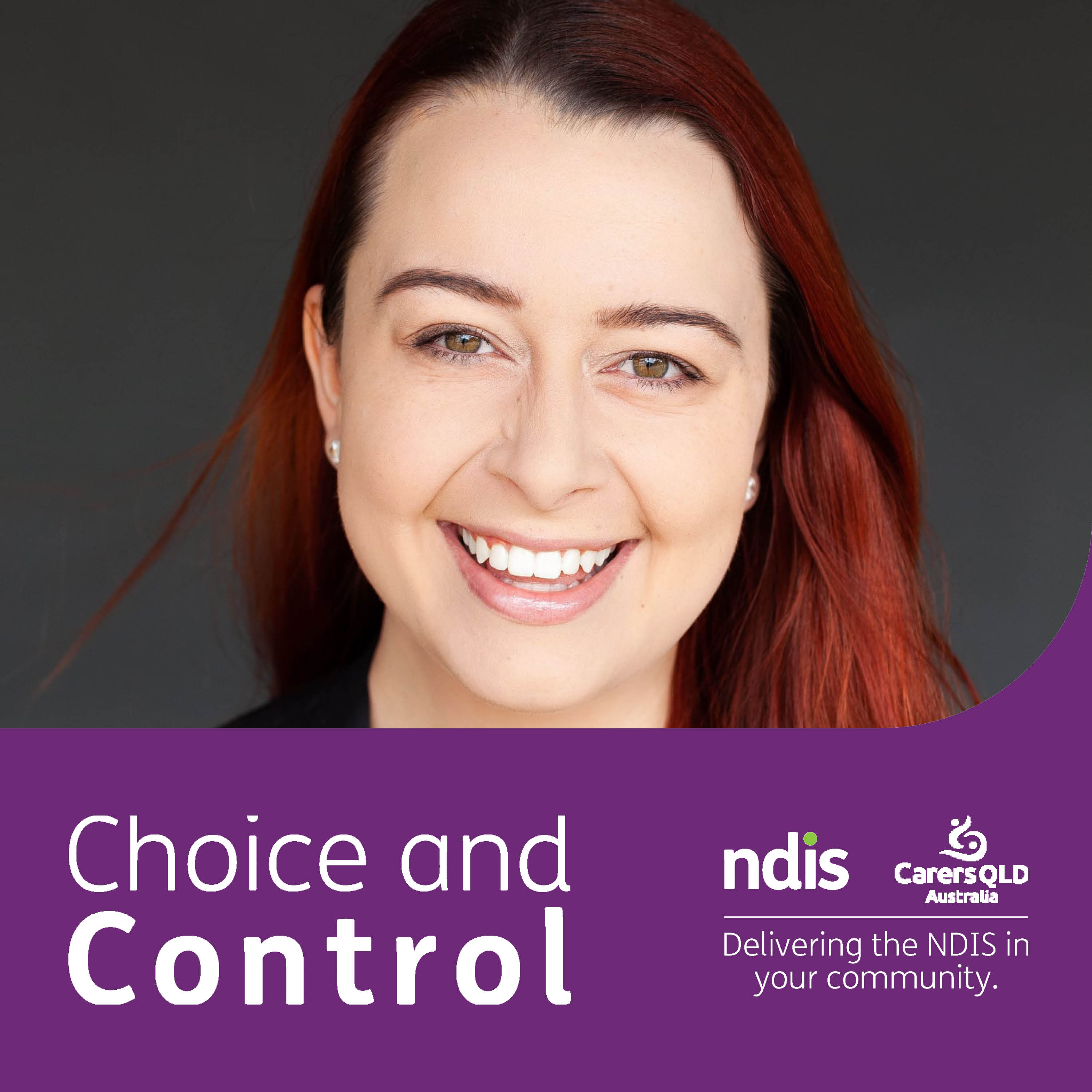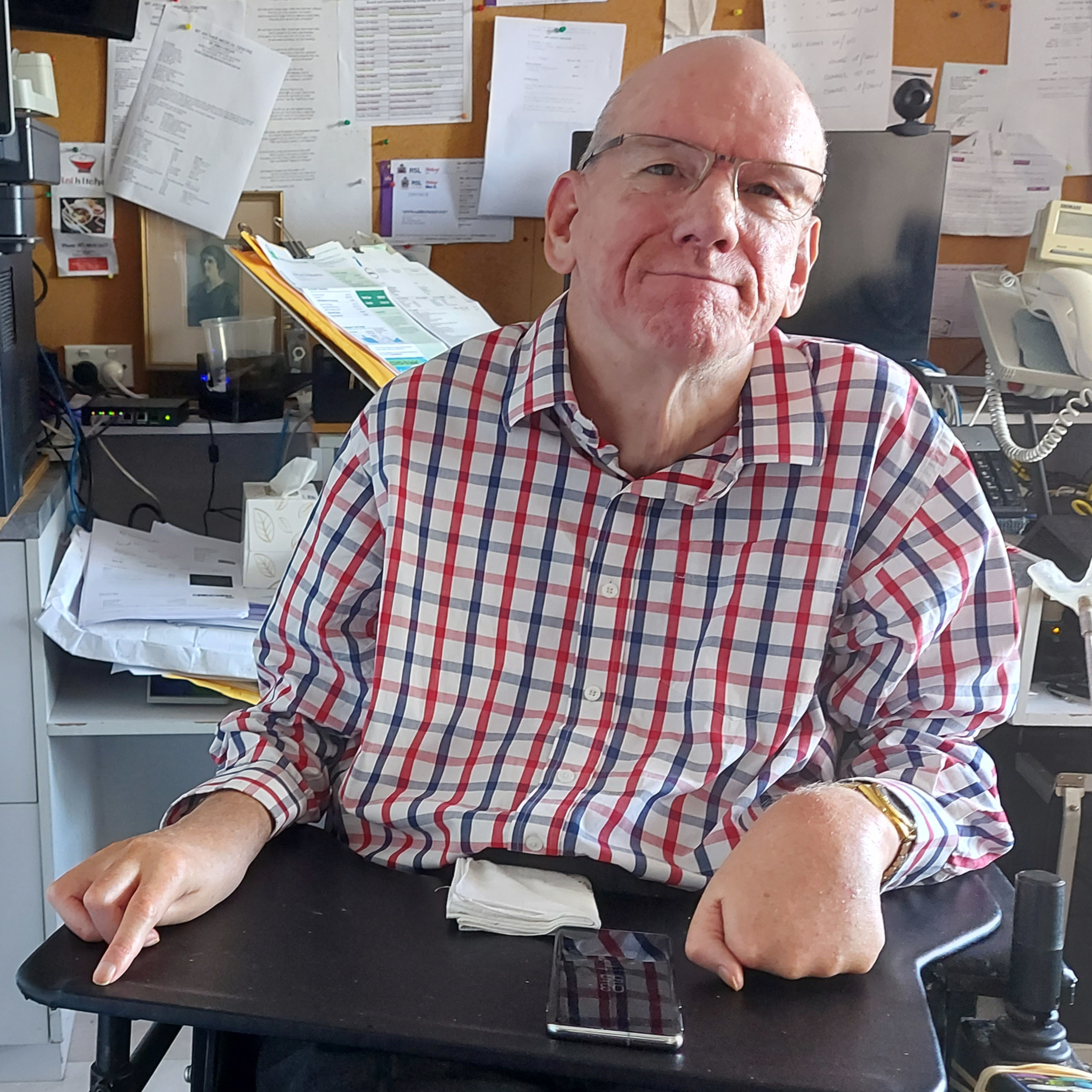Speaker 1 00:00:01 Sport is for everyone, whether you are playing for fun, competing, seriously, watching from the grandstand or volunteering in the canteen, there's a place for everybody. And every ability in the sporting community, carers Queensland is running discussion groups and surveys to find out more from people with disability, families, and carers, their experiences, thoughts, opinions, and insights into making sport more inclusive and accessible because that's a great goal. Find out more, get in touch or look for events and opportunities coming up near you. Visit our
[email protected] or call our inquiries line on one three hundred nine six three six,
Speaker 1 00:00:53 Joyce and control a podcast, celebrating people with disability brought to you by carers Queensland, N D I S local area coordination partner in the community. It's great. When the stars align and you can turn a passion into a career today, we're going to meet some blokes from the sporting world who have done just that Josh popper is heavily involved with his local rugby league team, the Redlands parrots, he's done some coaching training and his league safe officer. Josh has cerebral palsy and uses an electric wheelchair, and he's an active and vital part of his local team's community. We caught up with Josh and his mum, Lisa, to find out why Josh loves his rugby league,
Speaker 2 00:01:35 The mateship he's made lots and lots of very good friends and being part of a club in the community also help helps him be out there socially with a purpose too. Doesn't it? Yeah,
Speaker 3 00:01:54 That's right. Because Josh has been involved with rugby league. I understand it's the Redlands parrots for the past seven or eight years and the Capella bar warriors for the last five or six years previously as a valuable team player. One of those things has been him becoming a, a league safe officer. Tell me a little bit more about that.
Speaker 2 00:02:13 Okay. Well, he got into that because at high school, the thing that the boys did every lunch time was they never sat around. It was football the whole lunch time. And Josh actually used to physically play in his wheelchair. It was just the done thing. The lady that worked at the, um, canteen unbeknownst to us or Josh, she was actually a committee member at the Capella bar warriors. And so she went and saw, um, one of Josh's main teachers met Quinn and she just said to me, this guy absolutely loves footy. I love watching him cuz Josh could catch the ball, kick it. I'm glad I wasn't there to watch it cuz I would probably freaked out <laugh> but um, yeah she said, look, I'm I'm with the warriors. She said, I've gotta get this guy into our club somehow. He's just amazing. So she went back to the committee, they all had a discussion about it and they all decided yes, they would love to have him. And the way how they started him off was Josh did his work experience there, um, in year 11 and then it continued on from there. They said to him, um, we'd love you to go and do league safe course. So you can actually be legal cuz he knew he knew all the rules, everything there was to know that's when we went off and Josh did the course and became league safe, accredited,
Speaker 3 00:03:56 What did he have to do for that?
Speaker 2 00:03:59 They went, went through everything. What the role was. And then there was, um, you kind of had to answer some questions, but it wasn't anything that Josh couldn't answer. You have to know when you're allowed on the field and when you're not. And Josh was able to know all that information. If there was somebody on the field that required first aid, they were to signal or call for the trainer. And Josh could do that in the way of either putting his arm up, yelling and yelling out or using his, um, beeper on his chair. So, so he, he was able to pass the cord
Speaker 3 00:04:41 Mm-hmm <affirmative> sounds like it was the perfect role for him.
Speaker 2 00:04:46 Yes, very much. So the same gentleman from QR, I can't think of his name now was such a long time ago. Um, he also encouraged Josh cuz he said he believed that Josh could go on and do coaching. They had a big belief in him.
Speaker 3 00:05:03 Tell me how Josh completed the, the theory side of coaching through the QRL and, and how he's been a spokesperson for people with a disability to show that if people can't play that there are other avenues to sport
Speaker 2 00:05:18 That was going back, it was on a, on Saturday mornings, wasn't it? And it was about, you know, going through and answering the questions the way that, that even set out. A lot of the questions was like answer a, B, C, or D. So Josh could relay that to me. Mm-hmm <affirmative> and then they also had to do a part, they had to set up like a Minifield didn't you and say like, if you were doing training, what would you set out? So I wasn't involved in that. Josh did that with the guy from QR. So he passed all that. Like he, you know, he told the guy where to put all the equipment. And so he completed the theory side. I say that he would have to do that again. Cause that was quite a number of years ago. That was a long time.
Speaker 2 00:06:12 And they do it differently now, but he never actually did the practical side of it because at that stage he didn't have a good enough communication device because it meant you would have to be placed with the young team and converse with parents and the kids. And at that stage we didn't have a have good enough communication advice to do that. And Josh kind of wasn't, he was already with the older boys and had, he's been with them the whole time and he wasn't prepared to leave them to do a year with the younger team. He wanted to stick with his own team,
Speaker 3 00:06:57 With his mates already
Speaker 2 00:06:59 Adults and mates. And they put, you know, once, once you get to know Josh, they can pretty much work out what he's on about, um, what he's saying. So he was at, at that age, cause he was a lot younger himself. He wasn't prepared to do that. So that's what happened there.
Speaker 3 00:07:19 How important is inclusion in sports?
Speaker 2 00:07:22 Very much so. Cause there's lots, lots of kids, you know, that would love to be a part and some of them don't have Quay. Some of them have autism. There's lots of different. We do know that a couple of inner country clubs had, um, a couple of kids who were in wheelchairs that were there at every game. They just loved it. And they went on and got them to actually join the club. Somehow I don't know what their, their role was in that club, but some of them were talking about scoring. Hopefully that's what happens. So
Speaker 3 00:08:04 That's fantastic. It is really important. This is a sport that they love, that they should be able to take part in some way. And if it can't be playing, it can be other ways just like Josh is doing what other things does Josh's role at training and on weekend matches. What does Josh do?
Speaker 2 00:08:20 Still dabbles a bit on the coaching side with his main coach of the team and Joshua, um, spend some time during the week on his computer cuz he does, he has an eye tracker on his computer and he actually writes out himself his own spiel on what he thinks they need to do and builds them up before the game. And usually the captain or the coach reads out Josh's info. That's how Josh gets his point across on what they need to do. And you also just he's cause he's been with gappy, who's the main coach and they know Josh so well that Josh will actually just talk to gappy about what's he thinks some of the boys what plays they should be doing because gap understands what Josh is saying without using a, a communication device such as that's
Speaker 4 00:09:24 That's that's how you do it. Yeah.
Speaker 2 00:09:28 Yeah. So they come up with some game plans themselves
Speaker 4 00:09:32 Together. So yeah,
Speaker 3 00:09:36 That's great. It just really, um, spurs them on doesn't it?
Speaker 2 00:09:40 Yes. Yes. I suppose Josh being at, at the eye level that he is, he sees you see many good game plays don't you and roles and what, what they should be doing and what they shouldn't be doing. He goes out to him too. <laugh> does a bit of coaching from the sidelines. Sometimes
Speaker 1 00:10:05 Everybody has rights, but sometimes it's not easy to speak up and advocate for yourself. It takes confidence, resilience, knowing your rights and knowing someone has your back, be the voice you want to be can help. It's a free program from carers Queensland, for people with disability, it'll build your skills, help you be a strong advocate for yourself, your family and friends, maybe even your community along the way, you'll build a peer network. So you have a squad to support you speaking up, find out more, get in touch or look for events and opportunities coming up near you. Visit our
[email protected] or call our inquiries line on one, 300 triple 9, 6, 3 6. Josh does have plans to make sport his career. He's going to go back to study to get a cert for in sports and recreation. When he's not being kept busy by his multiple other jobs.
Speaker 2 00:11:03 He works two days at milestones printing and then the other three days, his auntie has her own business in the aged care industry. She got a grant through her business for Josh to get, have a computer. And he uses the I gaze and a couple of other switches. And Josh does, um, most of the invoicing and the rostering.
Speaker 3 00:11:29 Oh excellent. Josh enjoys that
Speaker 4 00:11:31 He does
Speaker 2 00:11:34 Most days.
Speaker 3 00:11:36 <laugh>
Speaker 2 00:11:40 I mean, you still have a vision of doing your sport and recreation certificate.
Speaker 1 00:11:46 Josh says all the things he's up to on and off the field have been made possible by support from the N D I S
Speaker 2 00:11:53 He wouldn't be able to do it without then. He wouldn't be able to be so fully involved if he didn't have his N D I S funding because they, they take him to training. They take Josh to all the games, you know, there's also that they then hang out at the club after, um, or they organize and meet at, you know, somewhere else. And without that, Josh wouldn't be doing all those extra things cuz you don't want your parents to be involved in that part of it. Um, and I mean they're out, you know, they could be down at the club till after midnight or you know, and when they're with the boys, it can go till like three o'clock in the morning.
Speaker 1 00:12:38 <laugh> of course. Yeah.
Speaker 2 00:12:41 So without N D I S he would not have, he would not be able to be so involved in his whole club. Socially Josh's whole life has changed from N D I S dramatically mm-hmm <affirmative>. And I, I sincerely say that with all my heart, that his life is so much, so much more. Now he's gone on holidays without us. Who's out living a life.
Speaker 1 00:13:10 Archie Graham from iwi is ranked number two in Australia, in men's single tennis for players with intellectual disability, like Josh he's then turned his attention to coaching. And he is now sharing his love of the sport with the next generation of tennis superstars. And it all started thanks to a family connection when Archie was very young,
Speaker 5 00:13:31 My grandmother had a tennis in her tennis main. Then I start again into the, um, disability, um, stages. Yeah.
Speaker 1 00:13:48 And how were those mainstream ones starting out with, were they a good place to be if you were a person with disability?
Speaker 5 00:13:53 Oh yeah, yeah, of course. Yeah. Um, a lot of them were nice to, and very tough as well was tennis. Me and my tennis made me tougher as a player and most of the people were nice to
Speaker 1 00:14:06 Me and all starting from that tennis court at your grandma's place, you have done so well for yourself. Could you talk us through some of the amazing things you've achieved in tennis?
Speaker 5 00:14:15 Mm-hmm <affirmative>, I've traveled overseas four times. I've to, I've been to, um, America, I've been to, um, England and I've, um, been to, um, France.
Speaker 1 00:14:26 You're a four times world singles champion. Is that right?
Speaker 5 00:14:31 Mm-hmm <affirmative> yes.
Speaker 1 00:14:32 As well as being an incredibly high achieving tennis player, you are now working on coaching accreditation. Is that right?
Speaker 5 00:14:42 Mm-hmm <affirmative> yes. Yes. That's something. I have a passion for kids tennis, something that I've looking for, you know, um, when I became an adult, lucky enough, tennis is challenging. So doing that sort of thing and, um, also giving back, you know, to help other players, you know, achieve their dreams stuff, whatever it may be. And, uh, yeah,
Speaker 1 00:15:38 If you are interested in getting involved in the sporting community, in any capacity from playing to coaching, maybe volunteering in the canteen carers Queensland may be able to help our inclusive sport and recreation communities. Project is looking at the way people with disability participate in the sporting world, head to our website, to find out more details or to have your say through the online survey carers qld.com.au. Thanks for joining us at choice and control a carers Queensland podcast. For more information about the national disability insurance scheme or carers Queensland, contact us
[email protected]. You can call us on one, three hundred nine, six, three, six, or head to Facebook and look for carers Queensland, N D I.


